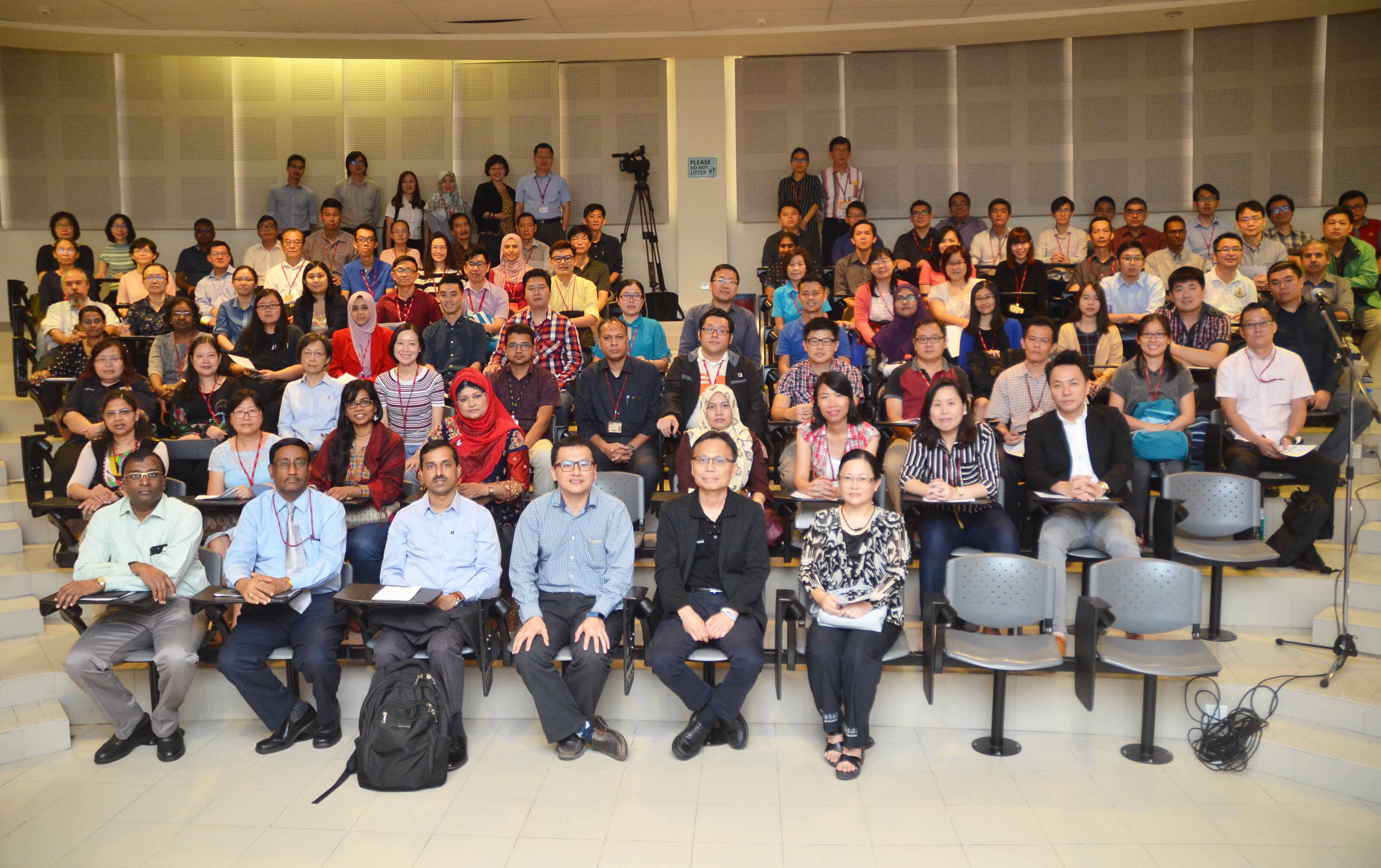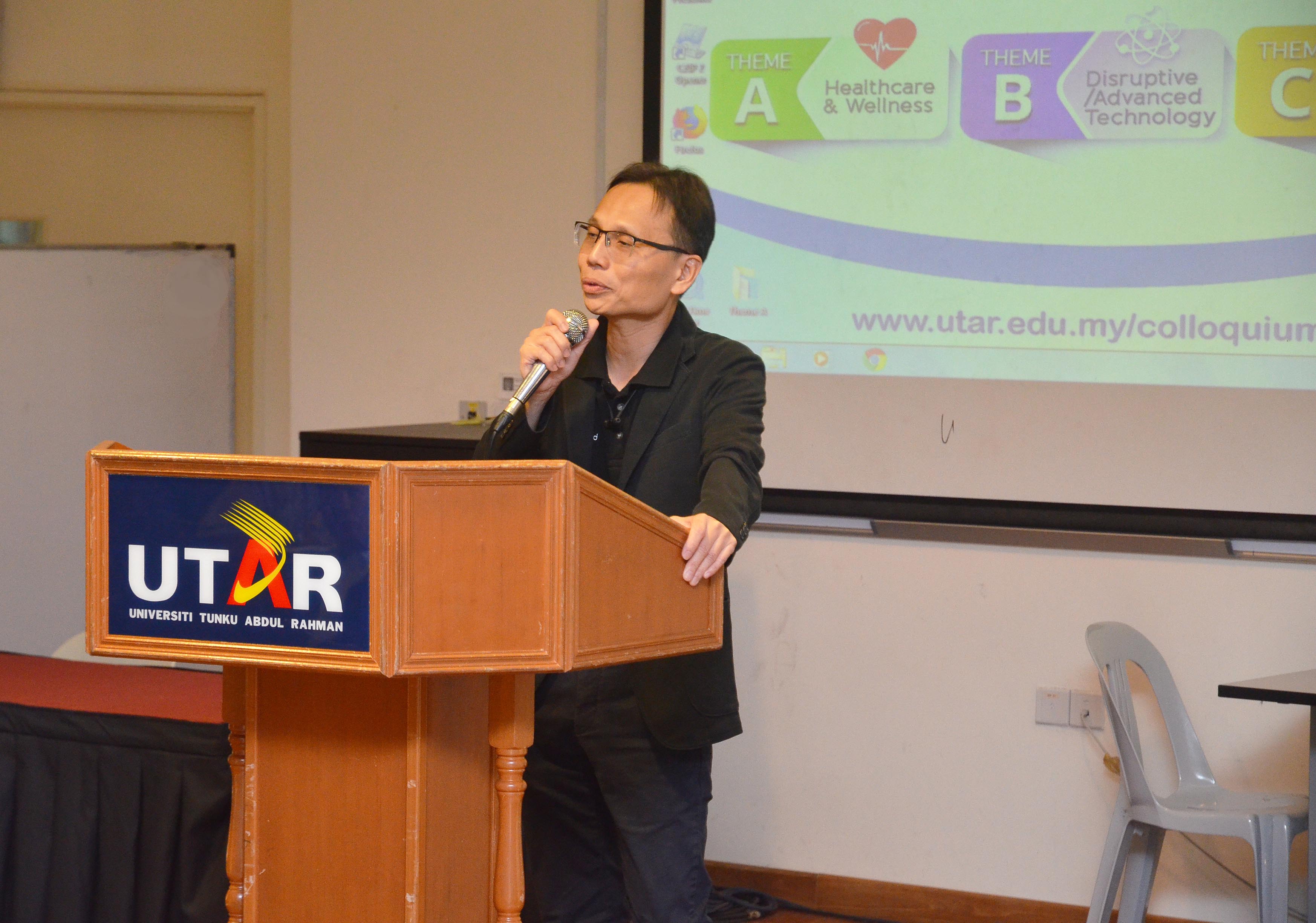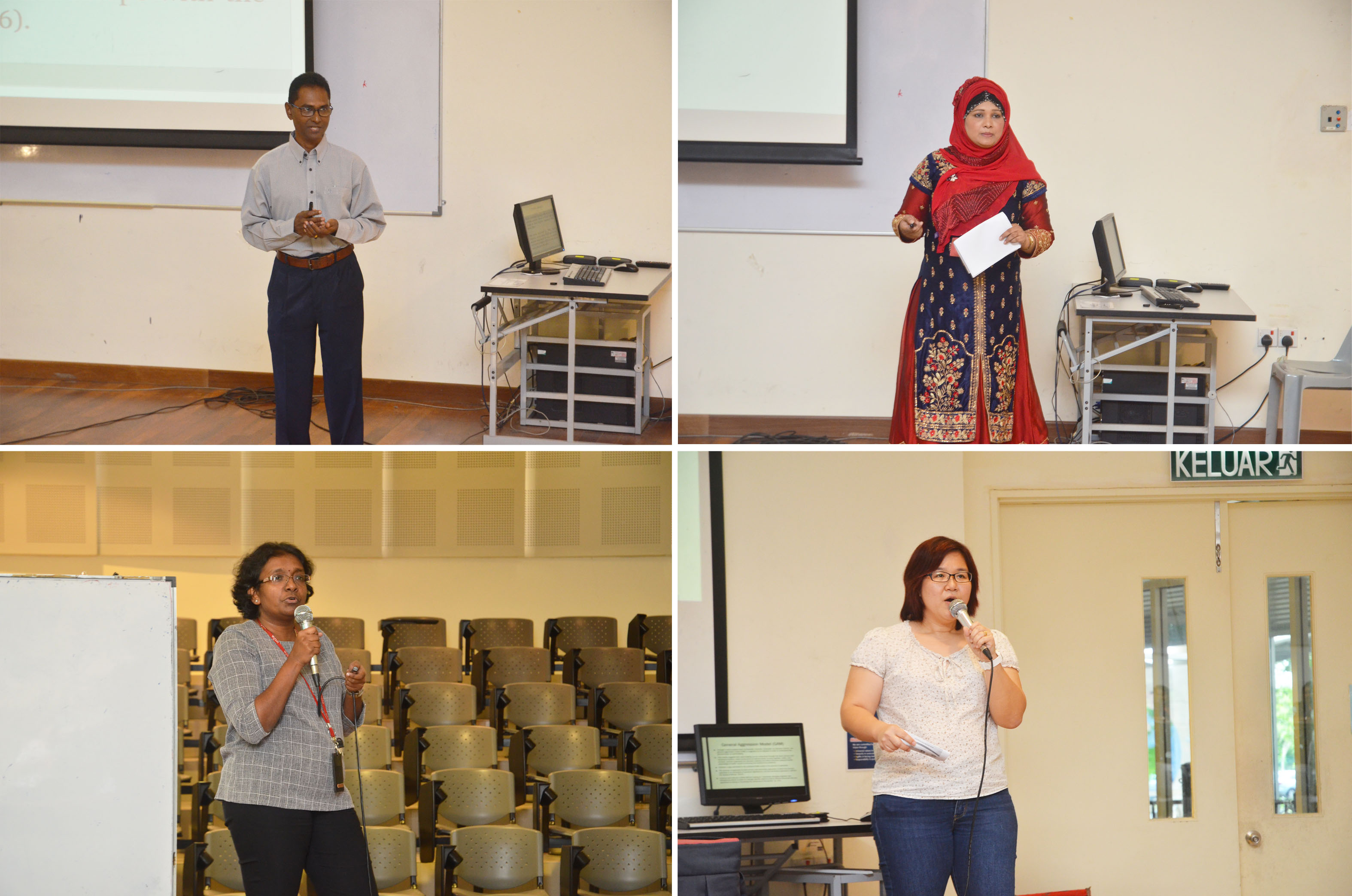

Prof Lee (second from right) with presenters and participants of the colloquium
Aimed at enhancing students and staff research experiences, UTAR Institute of Postgraduate Studies and Research (IPSR) is enduring the practice of organising two colloquiums per year. Held since May 2014, the Organising Committee once again successfully organised its ninth R&D Colloquium 2018 (1.0) at Kampar Campus on 21 April 2018.
The objective of the colloquium was to offer a platform to exchange research ideas, interests and project funding related to the cross-disciplinary topic areas. Presenters were encouraged to present early-stage research plan in order to receive some valuable feedback and suggestions. It also aimed to develop cross-disciplinary collaborations at a concrete level through finding synergies and common interests.
Some 120 local and foreign researchers joined and came together during the university’s biannual colloquium on research and development. The UTAR R&D Colloquium (1.0) 2018 brought research participants together to present and share their research efforts in multiple fields of studies.

Prof Lee emphasising the importance of cross-disciplinary
The one-day conference continued to strengthen and nurture regular interaction between researchers from the 32 research centres in UTAR by establishing research collaborations and reinforcing cross-disciplinary research. It also served as a platform for a continuous update on research outcomes to the research centres, faculties, IPSR, and the Vice President’s office for R&D and Commercialisation.
A total of 34 presentations on various topics including medical tourism, social media, foodborne infection, infant mortality rates, stem cells, mental health, cyber bullying, artificial intelligence, social economic impact, eco-friendly smart house, e-commerce and fourth industrial revolution, were delivered.
In his opening speech, UTAR Vice President for R&D and Commercialisation Prof Ir Dr Lee Sze Wei said, “I’m glad to be part of this colloquium for the past five years and it is indeed a great platform for all researchers to share their research methodologies and findings with other researchers and students. This colloquium also aims to help the participants to develop their analytical skills and engage in multi-disciplinary research. Thank you IPSR for the effort in organising the yearly colloquium with different themes. I believe this year’s themes will give deeper understandings to participants about the future global challenges and demands.”

Presenters, clockwise from top left: Dr Gerard, Dr Sultana, Dr Tan and Dr Sumathi
The colloquium started with the parallel sessions of this year’s colloquium. There were three sessions held concurrently with three themes, namely ‘Healthcare and Wellness’, ‘Disruptive/Advanced Technology’ and ‘Societal Impact of 4.0 IR’. It was chaired by the Chairperson of Centre for Stem Cell Research Prof Dr Alan Ong Han Kiat; Head of Department for Internet Engineering and Computer Science Dr B. Madhavan; and Chairperson of Centre for Accounting, Banking and Finance Dr Krishna Moorthy Manicka Nadar respectively.
Among the highlights were Assoc Prof Dr Tang Pek Yee’s presentation on “A potential link between opioid addiction (use or abuse) and schizophrenia-like behaviour”, Dr Fong Lai Yen’s presentation on “Investigation of the effects of asiatic acid on pre-lesional atherogenic events in vitro and atherosclerotic lesion formation in vivo”, Dr Leong Kah Hon’s presentation on “Silver Sulfide Quantum Dots Based Photocatalyst for Enhanced Absorption of Solar Light”, Dr Sin Jin Chung’s presentation on “Photocatalysis for environmental and energy applications”, Dr Alice Khaw Mei Kum’s presentation on “RFID Sensor Transponder with multiple energy-harvesting sources”, Dr Sumathi Sethupathi’s presentation on “Carbon Dioxide Methanation via Aluminum-Water Interface: Determination of Reaction Mechanism and Stability”, Dr Joanna Tan Tjin Ai’s presentation on “The social impacts of cyber bullying on psychosocial health: The mediating effects of primary appraisal and coping strategies in general aggression model”, Dr Sujan Chowdhury’s presentation on “Role of Elaeis guineensis (Oil Palm) mediated synthesis of stabilised Zinc-colloid nanoparticles over the Rubber waste effluent treatment”, Dr Ngoo Yee Ting’s presentation on “Entrepreneurship Intention Among Malaysia Undergraduates in E-Commerce: An SEM-PLS Approach”, Dr M Sultana Alam’s presentation on “An investigation of Gender Disparity in Malaysian Higher Educational Institutions (HEIs)” and Dr Gerard Sagaya Raj’s presentation on “The Malaysian University English Test and its Predictive Validity for Admission Purpose and Academic Performance".
One of the participants of the colloquium, a lecturer from the Faculty of Arts and Social Science Teh Boon Teck enthused, “I would like to thank UTAR and the organising committee for being active in organising events such as symposiums, forums and colloquiums for staff and students to network with the academics and industry players. It is indeed a great platform for all to improve in the field of research and development. The R&D colloquium is a platform for academics of varied disciplines to share their expertise and to exchange resources for R&D projects.”
In line with the Strengthening of Cross Disciplinary Research Centres under the UTAR 10-year Strategic Plan, IPSR organised UTAR’s maiden R&D Colloquium in 2014 at its Kampar Campus.
As a progressive University, UTAR constantly holds conferences and colloquia as platforms for researchers to share their research findings and network with others for more collaborative opportunities.
© 2019 UNIVERSITI TUNKU ABDUL RAHMAN DU012(A).
Wholly owned by UTAR Education Foundation Co. No. 578227-M LEGAL STATEMENT TERM OF USAGE PRIVACY NOTICE